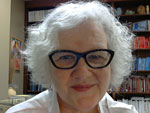
Roma Hanks, Ph.D
Research Interests
- Intergenerational Relationships;
- Lifecourse Transitions
- Social Support
- Health Disparities
Biography
Dr. Roma Stovall Hanks is Professor and Chair in the Department of Sociology, Anthropology and Social Work at the University of South Alabama. She also serves as Director, USA Programs in Gerontology; Academic/Research Director, USA Center for Generational Studies; and Co-Director of the Community Engagement Core of the Center of Excellence on Health Disparities (funded by NIH-NCMHD). Dr. Hanks holds the B.A. in Psychology from David Lipscomb University, the M.A. in Psychology from George Peabody College of Vanderbilt University and the PhD in Family Studies/Gerontology from the University of Delaware. Her dissertation on work/family issues around early retirement incentives earned the Best Dissertation Award (1990) from the Section on Aging and the Life Course of the American Sociological Association.
Dr. Hanks has been Principal Investigator of the Community Health Initiative, awarded to the USA Mitchell Cancer Institute by the Community Foundation of South Alabama and Principal Investigator of the multi-year Legacy Leadership Institute, funded by the South Alabama Regional Planning Commission – Area Agency on Aging and the Alabama Department of Senior Services. She has been Co-Principal Investigator on projects related to cancer prevention and control with funding by the Alabama Department of Public Health. Dr. Hanks, with colleague Nicole T. Carr, has also been funded by the Office or Juvenile Justice and Delinquency Prevention (OJJDP) to evaluate programs focusing on adjudicated youth and conduct life course research on women in jail. Currently, Dr. Hanks and colleagues from the University of Southern Mississippi (USM) and the University of Alabama-Birmingham (UAB) are studying social networks and multi-generational impacts of disaster on families and communities. Dr. Hanks also serves as Co-Director of the Community Engagement Core of the USA Center of Excellence on Health Disparities, an NIH-funded project based in the College of Medicine. She has over 20 years of experience in community outreach and applied sociological research.
Dr. Hanks serves on advisory boards for USA Continuing Medical Education; the University Committee for Undergraduate Research; Via Health, Fitness and Enrichment Center; the Gulf States Health Policy Research Center; and the Alabama Contemporary Art Center. She has published 7 books and numerous peer-reviewed journal articles. She is Past President of the Mid-South Sociological Association and of the Alabama Gerontological Society and Past Vice-President of the Delaware Gerontological Society. Dr. Hanks is a member of the American Sociological Association; the Southern Sociological Society; the Gerontological Society of America; and the Association for Gerontology in Higher Education, where she serves as Co-Chair of the Committee on Intergenerational Learning and Research.
Selected Publications
-
Russ, S. H., Cashen, C. C., Thomas, T., & Hanks, R. (2015). Smart grid architecture for unobtrusive home health monitoring. National Social Science Journal, 44 (1), 62-68.
-
Carr, N. T., & Hanks, R. S. (2013). Everything I’ve done I’ve done for men: One woman’s deployment of femininities and her pathway to crime. Sociological Spectrum, 33 (5), 433-452.
-
Carr, N. T., & Hanks, R. S. (2012). If “60 is the new 40,” is 35 the new 15? Late onset crime and delinquency. Deviant Behavior, 33 (5), 393-411.
-
Crook, E., Bryan, N., Hanks, R., Slagle, M., Morris, C., Ross, M., Torres, H., Williams, R., Voelkel, C., Walker, S., & Arrieta, M. (2009).A review of interventions to reduce health disparities in cardiovascular disease in African Americans. Ethnicity & Disease. 19(2), 204-208.
-
Arrieta, M. I.; Hanks, R., & Bryan, N. B. (2008). Establishing a multidisciplinary academic group to address health disparities.American Journal of the Medical Sciences. 335(4), 275-277.
-
Carr, N. T., Hudson, K., Hanks, R. S., & Hunt, A. (2008) Gender effects along the juvenile justice system: Evidence of a gendered organization. Feminist Criminology, 3(1), 25-43. (Best Paper 2008)
-
Flynn, N.T. Hanks, R.S. & Gurley, L. (2007). Stirred, shaken, or blended? Gender differences in processing and treatment of juvenile offenders. Women and Criminal Justice 18(4), 17-36.
-
Hanks, R. S. & Carr, N. T. (2007). Lifelines of women in jail as self-constructed visual probes for life history research. Marriage and Family Review, 42(4), 105-116.
-
Hanks, R.S. & Ponzetti, J. (2004). Family studies and intergenerational studies: Intersections and opportunities. Journal of Intergenerational Relationships, 2(3/4), 5-22.
-
Hanks, R. S. (2001). Grandma, what big teeth you have! The social construction of grandparenting by American business and academe. Journal of Family Issues, 22(5), 652-676.
-
Hanks, R.S. & Icenogle, M. (2001). Preparing for an age diverse work force: Intergenerational service-learning in social gerontology and business curricula. Educational Gerontology, 27(1), 49-70.


